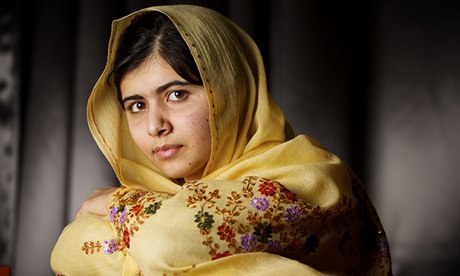
Monitoring Desk: Malala Yousifzai named as winner of 2014 Nobel Peace Prize. Human rights activists from Pakistan and India, Malala Yousafzai and Kailash Satyarthi, have named as the joint winners of the 2014 Nobel Peace Prize, the award’s committee announced in Oslo.
The is the second time that two neighbours India and Pakistan got Nobel Prize in same year. Dr Abdus Salaam of Pakistan and Mother Teresa of India got Nobel Prize in same year in past but they did not share the prize. This is first time India and Pakistan are sharing Nobel Prize.
“Showing great personal courage, Kailash Satyarthi, maintaining Gandhi’s tradition, has headed various forms of protests and demonstrations, all peaceful, focusing on the grave exploitation of children for financial gain,” said the Nobel Committee.
The Committee lauded Yousafzai for showing, “by example that children and young people, too, can contribute to improving their own situations,” and noted that she had done so “under the most dangerous circumstances.”

Wikipedia gives her story of life as:
Malala Yousafzai was born on July 12, 1997 in Swat valley of Pakistan. She is known for her activism for rights to education and for women, especially in the Swat Valley, where the local Taliban had at times banned girls from attending school. In early 2009, at the age of 11–12, Yousafzai wrote a blog under a pseudonym for the BBC detailing her life under Taliban occupation, their attempts to take control of the valley, and her views on promoting education for girls in the Swat Valley. On the afternoon of 9 October 2012, Malala boarded her school bus in the northwest Pakistani district of Swat. A gunman asked for Malala by name, then pointed a gun on her and fired three shots. One bullet hit the left side of Malala’s forehead, traveled under her skin the length of her face and then into her shoulder.
In the days immediately following the attack, she remained unconscious and in critical condition, but later her condition improved enough for her to be sent to the Queen Elizabeth Hospital in Birmingham, England, for intensive rehabilitation. On 12 October, a group of 50 Islamic clerics in Pakistan issued a fatwā against those who tried to kill her, but the Taliban reiterated its intent to kill Yousafzai and her father.
The assassination attempt sparked a national and international outpouring of support for Yousafzai. Deutsche Welle wrote in January 2013 that Yousafzai may have become “the most famous teenager in the world. United Nations Special Envoy for Global Education Gordon Brown launched a UN petition in Yousafzai’s name, using the slogan “I am Malala” and demanding that all children worldwide be in school by the end of 2015 – a petition which helped lead to the ratification of Pakistan’s first Right to Education Bill. In the 29 April 2013 issue of Time magazine, Yousafzai was featured on the magazine’s front cover and as one of “The 100 Most Influential People in the World”. She was the winner of Pakistan’s first National Youth Peace Prize. On 12 July 2013, Yousafzai spoke at the UN to call for worldwide access to education, and in September 2013 she officially opened the Library of Birmingham. Yousafzai is the recipient of the Sakharov Prize for 2013. On 16 October 2013 the Government of Canada announced its intention that the Parliament of Canada confer Honorary Canadian citizenship upon Yousafzai.[8] In February 2014, she was nominated for the World Children’s prize in Sweden.
On 10 October 2014, Yousafzai received the 2014 Nobel Peace Prize, becoming the youngest Nobel laureate ever.
